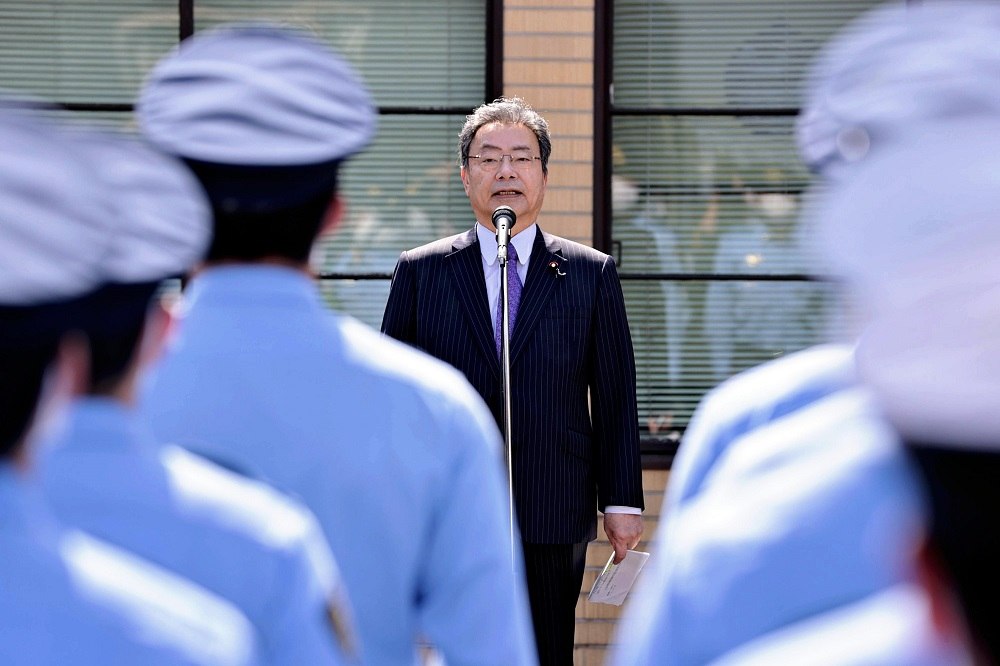
Koichi Tani, chairman of the National Public Safety Commission, speaks to a security unit in Minami Ward, Hiroshima, on Monday.
18:33 JST, May 2, 2023
In the wake of an attack on Prime Minister Fumio Kishida in April, security is being heavily tightened to ensure the safety of visiting dignitaries and prevent terrorist attacks at the Group of Seven summit in Hiroshima, which is weeks away.
G7 leaders including U.S. President Joe Biden and the heads of other invited countries such as South Korea and India will attend the summit, which takes place May 19-21.
“The host bears an important responsibility to ensure the security of dignitaries and smooth operation of relevant events,” Koichi Tani, chairman of the National Public Safety Commission, said to reporters on Monday at a temporary security facility on Ujina Island, where the main venue of the summit is located.
Wakayama attack
On April 15, Kishida was about to deliver a speech in support of an election candidate in Wakayama when a suspect standing about 10 meters away threw a makeshift bomb toward the prime minister.
Although Kishida was not hurt, the incident triggered concerns that the international community would lose faith in Japanese policing, with the Wakayama attack coming less than a year after the fatal shooting of former Prime Minister Shinzo Abe, who was also delivering a campaign speech when he was attacked.
In election campaigns, politicians often appear in front of large crowds. In contrast, the people who come into contact with dignitaries at summit meetings are typically limted to those related to the event.
As such, security methods for the two types of events are different.
During the summit, extra vigilance will be necessary when top-level officials move from one location to another. A focus of attention will be the route from Hiroshima Airport to the main summit venue. Police will have to guard convoys of dignitaries during the 55-kilometer journey, which takes about 50 minutes by car.
In the wake of the Wakayama attack, police will increase the number of officers at roadside areas and strengthen monitoring of suspicious objects and individuals.
Visiting leaders are also likely to visit the Peace Memorial Park in Hiroshima and Miyajima island, where the Itsukushima Shrine World Heritage site is located.
The main venue for the G7 summit is the Grand Prince Hotel Hiroshima, where several international conferences have been held, including an event related to the 2016 G7 Ise-Shima summit.
The hotel is located on the southeastern tip of Ujina, a small island in Hiroshima city’s Minami Ward waterfront area. The only road route to the island is via a bridge.
Measures to prevent close-range terrorist attacks from the ground would be aided by restricting access to Ujina and issuing passes to the island’s about 1,500 residents.
Drone threat
However, the advancement of drone technology in recent years means stronger vigilance will be needed against attacks from the air and sea.
A scenario in which multiple drones carrying explosives were flown remotely into the hotel at high speed would be a major threat.
In March, the Hiroshima prefectural government established an ordinance penalizing the use of drones over areas within 2.5 kilometers of the island.
The police will install drone detectors around the island and deploy a unit equipped with devices that can jam the signals of drones, rendering them inoperable.
The Japan Coast Guard is responsible for tackling the threat of a terrorist attack launched from the sea. During the summit period, it will deploy dozens of patrol vessels around the island.
From May 15, seafarers will be warned to avoid a zone within 300 meters of the island and the JCG will intercept and inspect vessels that approach it.
“We’d like to closely cooperate with the police to ensure seamless security on land and at sea,” a senior JCG official said.
Ukrainian President Volodymyr Zelenskyy has been invited to participate remotely in the summit, where messages related to peace and nuclear weapons are likely to be delivered from the atomic-bombed city of Hiroshima.
As large-scale global events can become targets of cyber criminals, Japanese authorities will have to be on the lookout for cyberattacks over the summit period.
Russia, which was banned from the 2018 Winter Olympics in South Korea over state-sponsored doping, is suspected of launching cyberattacks in retaliation for the ban.
Vigilance is required against attacks on key infrastructure such as the electricity supply for the main venue and the media center. The Hiroshima prefectural police have been conducting drills with electricity, railway and other companies to prepare for cyberattacks.
“We assume some kind of cyberattack will happen. The public and private sectors are cooperating to prepare for the threat,” a senior official at the National Police Agency said.
Top Articles in Politics
-

Japan PM Takaichi’s Cabinet Resigns en Masse
-

Sanae Takaichi Elected Prime Minister of Japan; Keeps All Cabinet Appointees from Previous Term
-

Japan’s Govt to Submit Road Map for Growth Strategy in March, PM Takaichi to Announce in Upcoming Policy Speech
-

LDP Wins Historic Landslide Victory
-

LDP Wins Landslide Victory, Secures Single-party Majority; Ruling Coalition with JIP Poised to Secure Over 300 seats (UPDATE 1)
JN ACCESS RANKING
-

Japan PM Takaichi’s Cabinet Resigns en Masse
-

Japan Institute to Use Domestic Commercial Optical Lattice Clock to Set Japan Standard Time
-

Israeli Ambassador to Japan Speaks about Japan’s Role in the Reconstruction of Gaza
-

Man Infected with Measles Reportedly Dined at Restaurant in Tokyo Station
-

Videos Plagiarized, Reposted with False Subtitles Claiming ‘Ryukyu Belongs to China’; Anti-China False Information Also Posted in Japan






















